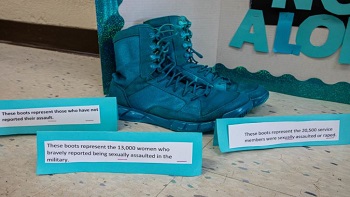 April is Sexual Assault Awareness and Prevention Month. The 25th Combat Aviation Brigade held a cake cutting ceremony at the Wings of Lightning Inn to kick off the annual Sexual Assault Awareness and Prevention Month at Wheeler Army Airfield, Hawaii, on April 6, 2021. We all have a role to play in ending sexual abuse, harassment, and violence (Photo by: Army Sgt. Sarah Sangster).
April is Sexual Assault Awareness and Prevention Month. The 25th Combat Aviation Brigade held a cake cutting ceremony at the Wings of Lightning Inn to kick off the annual Sexual Assault Awareness and Prevention Month at Wheeler Army Airfield, Hawaii, on April 6, 2021. We all have a role to play in ending sexual abuse, harassment, and violence (Photo by: Army Sgt. Sarah Sangster).
Effects of sexual assault
Every sexual assault victim experiences trauma uniquely, said the expert.
"Different life experiences and factors of an assault may shape an individual's reactions," said Galbreath. "Similarly, there are a variety of factors that may have occurred during an assault that can impact a victim's ability to heal."
In addition, there are numerous potential psychological consequences of sexual assault, including post-traumatic stress disorder, depressive disorders, anxiety disorders and substance use, said Holly O'Reilly, who has a doctorate in clinical psychology and specializes in sexual assault at the Defense Health Agency's Psychological Health Center of Excellence (PHCoE) in Silver Spring, Maryland.
"Many survivors report feelings of isolation, fear, anxiety, shame, anger, or shock," said O'Reilly. "Others report difficulty concentrating, intrusive thoughts of the assault, or depressed mood, and many report having difficulties trusting others, disruption in their relationships, and a loss of interest in sexual activity."
And while some will experience symptoms that subside over time, others may have their symptoms continue or worsen, and health care support is recommended. When initiated quickly, O'Reilly noted evidence-based treatments, including several types of cognitive-behavioral therapies, are effective in treating the specific psychological symptoms that follow sexual assault.
"The PHCoE supports survivors by providing mental health care providers in the Military Health System with education and training and a variety of evidence-based clinical support tools for treating the psychological consequences of sexual assault," she said. "We encourage those who are struggling to seek help from a mental health provider who has been trained in cognitive-behavioral therapy for mental health issues that may result from sexual assault."
She explained the active treatments have been designed to reduce the post-traumatic symptoms and help survivors move forward by emotionally processing what happened, safely facing their fears in a controlled setting, or helping change their thinking about the sexual assault. In other words, they learn healthier ways to think about and cope with the assault, even though they may never forget the trauma, she noted.
"Successful psychotherapy can help survivors to close the chapter and move on rather than let the sexual assault dictate the rest of their life," she added.
According to SAPRO's Galbreath, the process of recovery from trauma happens on a continuum that begins with the experience of the trauma and ends with resilience.
Preventing sexual assault
To prevent sexual assault in the military community, Galbreath said DOD focuses on addressing the underlying factors that contribute to sexual assault. SAPRO enacted an integrated policy to prevent violence and the 2019-2023 Prevention Plan of Action to implement a dedicated prevention system at every level of the military staffed by prevention personnel in a leadership-supported environment.
"At SAPRO, we're contributing by providing the military community with education, tools, and evaluation methods to help stop sexual assault from happening in the first place," he said. "For example, SAPRO is developing a department-wide prevention curriculum to equip personnel with knowledge, skills, and resources to select, implement, and evaluate research-based prevention activities as well as providing targeted training for its junior leaders and new supervisors to better promote respectful and inclusive workplaces."
However, encouraging survivors to report sexual assault is harder. According to Galbreath, the decision is deeply personal, but DOD offers restricted and unrestricted reporting options to allow sexual assault survivors to exercise control over how and when they engage with resources.
"DOD encourages reporting to connect victims to support services and recovery care - and to aid in efforts to hold alleged offenders appropriately accountable," he said. "Service members coping with an incident of sexual assault may also confidentially seek assistance from a Special Victims Counsel or Victims Legal Counsel - a military attorney - to understand their rights and the military justice process, as appropriate."
In addition, he said, the Safe Helpline personnel can provide crisis intervention support and - with their robust and verified database of resources across the nation - refer members to care resources within their local community or to the closest SARC or SAPR victim advocate. SAPRO also launched the Catch a Serial Offender (CATCH) program to identify repeat offenders.
"It provides service members and their adult dependents who have filed a restricted report of sexual assault a new, confidential way to provide information about the alleged offender and incident to DOD criminal investigators without initiating an investigation," said Galbreath.
For more information on DOD reporting options and resources, please visit the Victim Reporting Options Guide. For more information on assistance to survivors of sexual assault, please visit the Victim Assistance page.